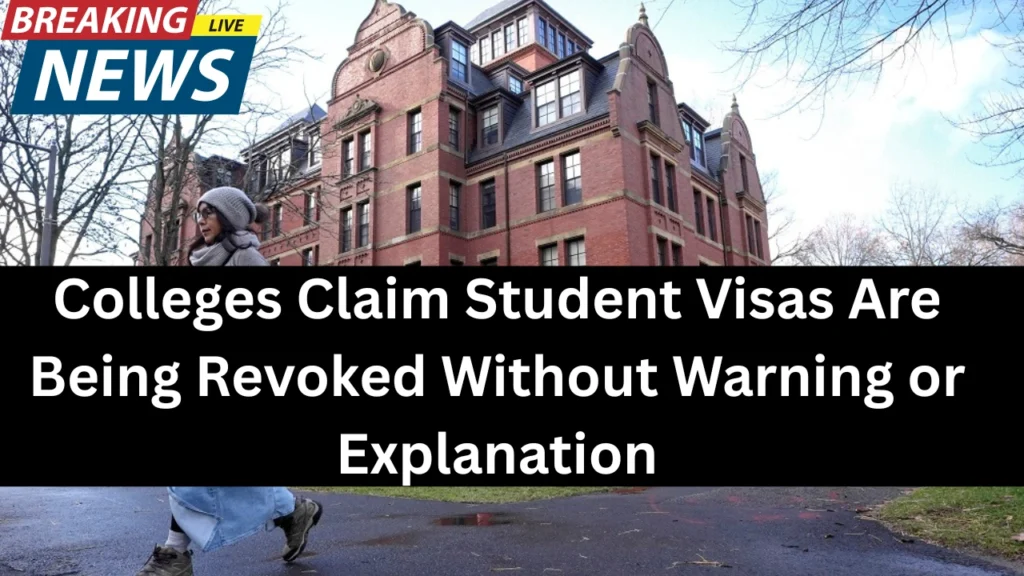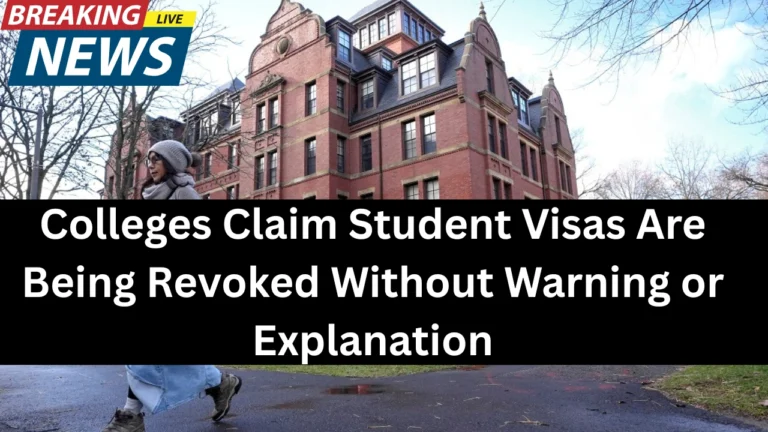Colleges Claim Student Visas Are Being Revoked : In a development that has alarmed academic institutions and immigration advocates alike, prominent U.S. universities, including Columbia University, Harvard University, and the University of California, San Diego, have reported that student visas are being revoked suddenly and without explanation. The abrupt revocations have left colleges scrambling for answers, with no prior notice from immigration authorities and no formal justification provided in many cases.

The revelation comes amid growing concerns over U.S. immigration enforcement targeting international students — a group that contributes significantly to the country’s academic, cultural, and economic ecosystem.
Yesterday, dozens of full-time university students across the country were informed that their visas had been revoked, many if not all with no explanation. Legal networks are available for support. If you are a student, please do not try to take this on yourself. For UCLA folks: pic.twitter.com/YLb6rHNMFL
— Nour Joudah (@nsdoud) April 5, 2025
Top Universities Left in the Dark
Universities have stated that they discovered visa cancellations not through official communication from the government, but rather by monitoring internal databases of international student statuses or, more worryingly, after learning of arrests by immigration enforcement.
Officials from institutions like Harvard and Columbia have expressed frustration over the lack of transparency.
“We were not informed about the revocations nor given any justification,” said one university administrator, speaking on condition of anonymity. “We have international students panicking, and no one knows how to help them because we don’t know what went wrong.”
Arrests Add to the Chaos
In some instances, U.S. Immigration and Customs Enforcement (ICE) has reportedly taken students into custody without notifying their respective universities. These students, many of whom were in good academic standing and maintaining legal status, were detained under vague charges such as status violations or visa fraud suspicions, though specific evidence was not made publicly available.
“We only found out a student was detained after their family contacted the university,” a spokesperson from the University of California, San Diego said. “It’s shocking and deeply concerning.”
A Broader Pattern?
These recent events are part of what appears to be a larger trend of stricter immigration enforcement impacting foreign students, especially those from countries like China, India, and Iran. Experts suggest that recent geopolitical tensions and national security concerns may be driving a quiet crackdown on visa holders.
According to data from the Student and Exchange Visitor Information System (SEVIS):
- Visa revocations have increased by over 20% in the past six months.
- Most affected students were enrolled in STEM fields—science, technology, engineering, and mathematics.
- Several students had no disciplinary or academic issues on record at their institutions.
Education Secretary Speaks Out
Speaking on the matter, Education Secretary Linda McMahon stated in an interview Tuesday that universities should take more responsibility for verifying the intent and background of incoming international students.
“It’s not just the government’s job,” she said. “Colleges must ensure that students they admit on visas are here for academic purposes, not other agendas.”
Her comments have drawn sharp criticism from university officials, who argue that institutions already follow rigorous federal guidelines when admitting and monitoring international students.
“We vet students thoroughly through academic records, English proficiency, financial documentation, and more,” said a senior administrator at a major East Coast university. “We cannot be held responsible for unexplained immigration decisions after admission.”
Impact on International Education
The implications of these sudden visa revocations go far beyond individual cases. International students make up a critical segment of the U.S. higher education landscape:
- Over one million international students study in the U.S. each year.
- They contribute approximately $38 billion annually to the U.S. economy.
- Many go on to join the American workforce in high-demand sectors.
The recent actions risk damaging the reputation of the U.S. as a welcoming destination for global talent. Many students now say they are reconsidering their plans to study in the U.S., fearing legal uncertainty and arbitrary enforcement.
“I’ve worked hard to come to the U.S. for a degree in computer science,” said Rakesh, a graduate student from India. “Now I don’t know if I’ll be sent home tomorrow without a reason.”
Universities Urge Transparency and Fairness
In a joint statement, representatives from a coalition of leading universities urged the federal government to:
- Provide advance notice and justification for any visa revocations.
- Establish a formal appeals process for affected students.
- Coordinate with schools before taking enforcement actions that disrupt education.
“We are committed to maintaining national security,” the statement read, “but that commitment must not come at the cost of transparency, due process, and the future of legitimate students.”
Legal Experts Question Due Process
Immigration attorneys argue that revoking visas without formal notice could be legally problematic and may violate the principles of due process under U.S. law.
“Students are being punished without ever being told what they did wrong,” said Rachel Klein, an immigration lawyer based in New York. “That’s not how the U.S. justice system is supposed to work.”
She added that some students have already been deported, while others are in legal limbo awaiting hearings or clarification from the Department of Homeland Security.
The Risk of Overreach
The growing sentiment among education leaders is that while national security must be safeguarded, there is a fine line between vigilance and overreach. Treating international students—many of whom have no infractions or violations—as threats without evidence undermines the trust between academic institutions and the federal government.
“If we treat every student as a suspect,” said a university president from a Midwestern school, “we risk turning away the very minds that contribute to our innovation, research, and global leadership.”
Conclusion
As confusion deepens and fear spreads among international students, American universities are calling for urgent policy clarification and greater collaboration with federal agencies. The current approach of quietly revoking visas without transparency is drawing criticism not only from educational institutions but also from civil rights groups, legal experts, and student advocates.
The U.S. has long been a beacon for international talent and academic excellence. To preserve that legacy, a balanced, transparent, and fair immigration policy is essential—not just for the future of these students, but for the future of American higher education itself.

